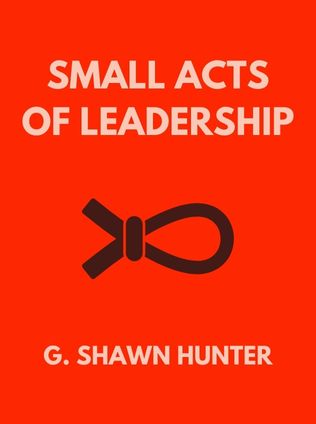
Small Acts of Leadership
12 Intentional Behaviors That Lead to Big Impact
By G. Shawn Hunter
Published 12/2016
About the Author
Shawn Hunter is an accomplished entrepreneur, speaker, and author known for his expertise in leadership and personal development. He founded Mindscaling, a company that produces online learning courses based on the works of best-selling authors. Hunter's professional journey includes serving as the executive producer and vice president for Leadership Solutions at Skillsoft. During his career, he has interviewed and collaborated with numerous business leaders, authors, and academics, gathering a wealth of knowledge that he shares in his books and talks. His book "Small Acts of Leadership" encapsulates his insights into how small, consistent actions can lead to significant personal and professional growth.
Main Idea
"Small Acts of Leadership" explores the concept that leadership is not about grand gestures or dramatic changes but rather about small, intentional behaviors that accumulate over time. In the modern business environment, where constant connectivity can lead to burnout, Hunter argues that adopting simple daily habits can enhance one's leadership skills, build confidence, and inspire others. The book outlines 12 key competencies that are integral to effective leadership, each supported by research and real-world examples.
Table of Contents
- Believe in Yourself
- Build Confidence
- Introduce Challenge
- Express Gratitude
- Fuel Curiosity
- Grant Autonomy
- Strive for Authenticity
- Be Fully Present
- Inspire Others
- Clarify Roles
- Defy Convention
- Take a Break
Believe in Yourself
Self-belief is foundational to effective leadership. Hunter differentiates between self-esteem and self-efficacy, noting that while self-esteem relates to our overall sense of worth, self-efficacy is our belief in our ability to succeed in specific situations. A strong sense of self-efficacy enables leaders to take risks, embrace challenges, and recover from setbacks. Hunter addresses the issue of "impostor syndrome," a phenomenon where individuals doubt their accomplishments and fear being exposed as frauds. He encourages readers to acknowledge their achievements and understand that everyone experiences moments of doubt.
"You do deserve to be here. It wasn't luck. It was your tenacity and hard work." — Shawn Hunter
building self-belief include:
- Reflecting on past successes and identifying the skills and efforts that contributed to those achievements.
- Seeking constructive feedback to gain a realistic view of one's strengths and areas for improvement.
- Setting small, achievable goals to build confidence incrementally.
Build Confidence
Confidence is crucial for leadership, but it doesn't appear magically; it is built through deliberate actions. Hunter discusses the importance of preparation, visualization, and social support in cultivating confidence. Preparation involves thorough readiness for tasks and challenges, which fosters competence and, consequently, confidence. Visualization entails recalling past successes to reinforce a positive self-image and boost self-assurance. Additionally, having a strong support network, including mentors and coaches, provides guidance and encouragement.
"Seek small improvement one day at a time. That's the only way it happens. And when it happens, it lasts." — John Wooden
building confidence include:
Sign up for FREE and get access to 1,400+ books summaries.
You May Also Like
The Subtle Art of Not Giving a F*ck
A Counterintuitive Approach to Living a Good Life
By Mark MansonRich Dad Poor Dad
What the Rich Teach Their Kids About Money - That the Poor and Middle Class Do Not!
By Robert T. KiyosakiHow To Win Friends and Influence People
The All-Time Classic Manual Of People Skills
By Dale CarnegieQuiet: The Power of Introverts
The Power of Introverts in a World That Can't Stop Talking
By Susan Cain



















